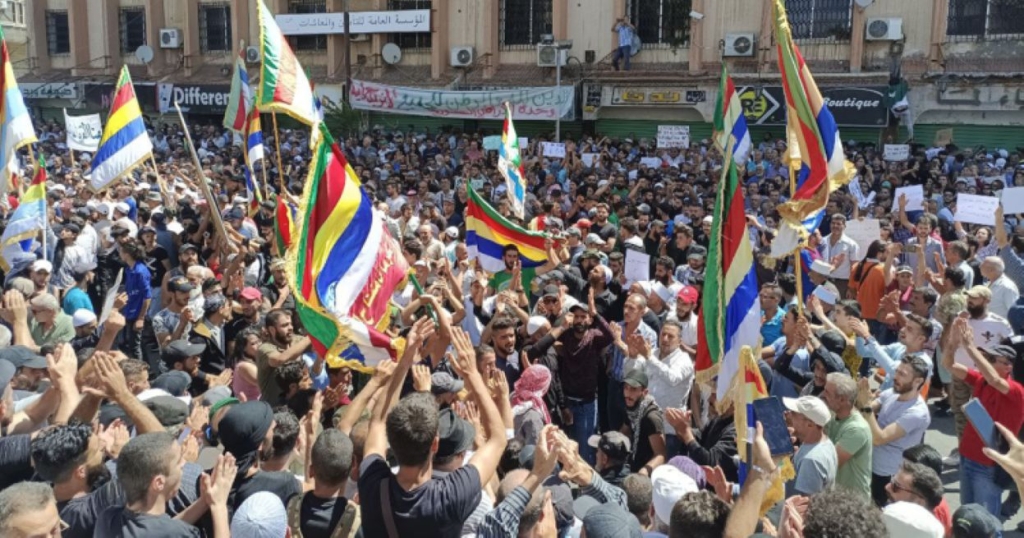Suwayda protesters demand self-determination amid siege and heavy death toll
SUWAYDA, Syria — In a scene charged with anger and despair, hundreds of demonstrators gathered in Al-Karama Square in the southern Syrian city of Suwayda, raising a slogan never before heard in the history of the Druze movement: “Right to Self-Determination.” The protest, coming just weeks after deadly clashes that left more than 1,600 people dead, was both a political declaration and a desperate cry for survival.
Protesters carried Druze flags, alongside a number of Israeli flags, and held aloft portraits of Sheikh Hikmat al-Hajri, the most prominent spiritual leader of Syria’s Druze community. Chants filled the square: “Free Suwayda, free … Al-Jolani get out!” — a reference to the leader of Hay’at Tahrir al-Sham, whom locals hold responsible for the recent bloodshed.
Placards revealed a new and striking discourse: “Right to Self-Determination is a Sacred Right for Suwayda,” “We Demand the Opening of a Humanitarian Corridor,” and “Remove the General Security from Our Villages.”
On a small platform, a local activist voiced unprecedented words: “We do not want autonomous administration or federal rule … we want full independence.” The statement drew applause from the crowd, signaling a sharp shift in Druze rhetoric, which had previously vacillated between calls for reform and decentralization, but had never before embraced outright separation.
“Today, Suwayda has taken a clear stance … our slogan is self-determination,” said protester Munif Rashid in comments to AFP. “No one can blame us after the attacks we suffered.”
“We have been under complete siege for over a month,” added Mustafa Sahnaoui, a Syrian-American participating in the demonstration. “No water, no electricity, no food. We call on the international community and US President Donald Trump to intervene immediately and open humanitarian corridors.”
The protest followed a bloody week that began on 13 July, when clashes erupted between Druze fighters and Bedouin tribal militias. The violence quickly escalated with the involvement of government forces and pro-government tribal groups. According to the Syrian Observatory for Human Rights (SOHR), more than 1,600 people were killed, including hundreds of Druze civilians, in fighting that also saw field executions and widespread abuses.
Israel later intervened militarily, launching strikes near the presidential palace and the General Staff headquarters in Daramsuq (Damascus), declaring that it “will not allow the Druze minority to be targeted.”
Despite a ceasefire declared on 20 July, Suwayda remains under siege, residents say. Electricity and water have been cut, food supplies are critically low, and the main road linking the city to Daramsuq remains blocked by pro-government checkpoints. While the Red Crescent has delivered some humanitarian aid, local activists described it as “utterly insufficient.”
Syria’s Ministry of Justice announced the creation of an investigative committee, promising a report within three months. But Druze religious leaders and activists rejected the move, demanding an independent international inquiry and accusing the government itself of complicity in the events.
The demonstration under the banner of “Right to Self-Determination” marks more than just a passing protest. It reflects a deepening political shift within Syria’s Druze community — one that could fundamentally alter the dynamics of the Syrian conflict. The pressing question now is whether this marks the beginning of a genuine push for secession or a new bargaining tactic against the central government. In either case, the small, mountainous province of Suwayda has become the latest flashpoint drawing global attention.



















